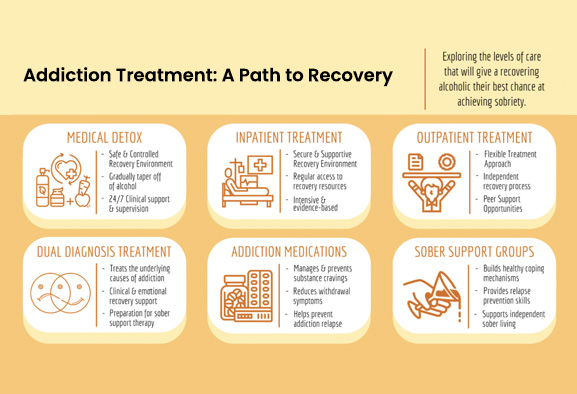Overcoming drug and alcohol addiction is a challenging journey that demands dedication, support, and expert guidance. Residential drug & alcohol addiction treatment, also known as inpatient rehab, offers a structured and immersive approach to help individuals break free from the grips of addiction.
Let’s explore the world of residential addiction treatment, shedding light on its effectiveness, the therapies involved, and the holistic care that addresses the physical, emotional, and psychological aspects of addiction.
What is Residential Drug & Alcohol Addiction Treatment?
Residential drug and alcohol addiction treatment is an intensive and comprehensive approach to overcoming substance abuse. It involves immersing oneself in a specialized facility designed to provide round-the-clock care and support.
This immersive environment allows individuals to focus solely on their recovery journey without the distractions and triggers of the outside world.
At the core of residential treatment lies the creation of a safe and nurturing environment. Professional staff members, including therapists, counselors, and medical professionals, work together to create personalized treatment plans for each resident.
These plans are tailored to address the unique needs and challenges of the individual, ensuring that no aspect of recovery goes overlooked.
What are some effective Residential Inpatient Treatments?
When facing the challenges of addiction, seeking professional help and support is paramount. Comprehensive addiction treatment programs encompass a range of essential components to address the complexities of substance abuse effectively.
Here’s the list of treatments:
Medical Detox:
Medical detoxification marks the initial phase of addiction treatment. Under the supervision of medical professionals, individuals undergo detox to safely and comfortably rid their bodies of addictive substances. This process helps manage withdrawal symptoms and prepares individuals for the subsequent phases of treatment.
Individual Therapy:
Individual therapy stands as a cornerstone of comprehensive addiction treatment. During one-on-one sessions with trained therapists or counselors, individuals have a safe space to explore the root causes of their addiction and work towards personal growth and healing. These sessions foster self-awareness and provide valuable insights into developing healthier coping mechanisms.
Medication Management:
In some cases, medication may be a crucial component of addiction treatment. Medication management involves the responsible use and monitoring of prescribed medications to address withdrawal symptoms, cravings, or underlying mental health issues. It is an integrated approach that complements other therapeutic interventions.
Family or Couples Counseling:
Addiction affects not only the individual but also their loved ones. Family or couples counseling is an integral part of comprehensive treatment, helping to repair and rebuild relationships. It fosters open communication, understanding, and support, creating a stronger foundation for recovery.
Addiction Education:
Empowering individuals with knowledge about addiction is essential for sustainable recovery. Addiction education sessions provide valuable insights into the nature of addiction, its effects on the brain and body, and the potential consequences of substance abuse. Understanding the challenges they face equips individuals to make informed decisions and better engage in their treatment.
Skills-Building Sessions:
Equipping individuals with practical life skills is another vital aspect of comprehensive treatment. Skills-building sessions cover various areas, such as stress management, communication, problem-solving, and coping strategies. These skills enhance resilience and empower individuals to navigate life’s challenges without resorting to substance use.
Follow-Up Care:
Comprehensive addiction treatment goes beyond the residential phase. Follow-up care ensures continuity of support after completing the initial treatment program. This may involve continued therapy sessions, check-ins, and additional resources to maintain progress and prevent relapse.
Referrals to Support Groups:
Support groups provide a sense of community and understanding, connecting individuals with peers who share similar experiences. As part of comprehensive addiction treatment, referrals to support groups like Alcoholics Anonymous (AA) or Narcotics Anonymous (NA) offer ongoing encouragement and a support network beyond the treatment facility.
What are the benefits of Residential Inpatient drug rehab centers?
Residential inpatient drug rehab centers give people who are trying to get over drug abuse and addiction a highly structured and supportive environment.
These centers are different from other treatment options because they offer a wide range of specialized services. In this article, we’ll talk about the many reasons why residential inpatient drug rehab centers are the best choice for many people who are trying to get better.
Intensive and Focused Treatment:
Residential drug rehab centers offer treatment programs that are intense and focused. By putting people in a residential setting, they can focus on getting better without being bothered by the outside world. The daily schedules and therapy sessions make sure that every aspect of addiction is taken care of.
24/7 Medical and Emotional Support:
One of the best things about residential inpatient drug rehab centers is that they offer medical and emotional support 24 hours a day, 7 days a week. Trained professionals are always on hand to handle any medical emergencies, help with detox, and give emotional support throughout the entire treatment process.
Safe and Monitored Detoxification:
Detox is often the first step in getting over an addiction, and it can be hard and even dangerous. Residential inpatient drug rehab centers make sure that detox is safe and supervised so that people can deal with withdrawal symptoms with medical help and support.
Holistic Healing Approaches:
These rehab centers take a whole-person approach to healing. This means that they treat not only the physical parts of addiction, but also the emotional, mental, and spiritual parts as well. People can experience full healing and personal growth through different types of therapy, such as individual counseling, group therapy, and holistic activities.
Peer Support and Community:
When you’re around other people who understand what it’s like to deal with addiction, you feel like you have a strong sense of community and support. Residential inpatient drug rehab centers provide a place for people to meet others who have been through similar things and get support and friendship from them.
Personalized Treatment Plans:
The road to recovery is different for everyone, and residential inpatient drug rehab centers know this. They make treatment plans for each person that is specific to their needs, challenges, and goals. This makes sure that the treatment is effective and focused on the person’s growth.
Skill-Building and Relapse Prevention:
Residential drug rehab centers focus on skill-building workshops and ways to keep people from going back to drugs. Through these programs, people learn how to deal with problems, how to deal with stress, and how to get along with other people without using drugs.
Dual Diagnosis Treatment:
Many people who have problems with drugs also have problems with their mental health. Dual diagnosis treatment is available at residential inpatient drug rehab centers. This means that both addiction and mental health issues are treated at the same time for better results.
Structured Aftercare Planning:
The end of the residential program is not the end of recovery. These centers offer structured plans for aftercare, such as outpatient services, referrals to support groups, and ongoing counseling, so that people can get help and keep making progress even after they leave the facility.
Focus on Long-Term Sobriety:
The main goal of residential inpatient drug rehab centers is to give people the tools and support they need to stay clean in the long term. By focusing on long-term recovery and preventing relapse, these centers help people get on the path to a healthier and more fulfilling life after addiction.
Conclusion:
Residential inpatient drug rehab centers provide a wide range of services and a supportive environment for people who want to beat addiction. With personalized care, support 24 hours a day, and a focus on whole-person healing, these centers give addicts the tools they need to stay clean and have a brighter, drug-free future.
All American Detox is a leading Drug Rehab Center in Los Angeles California dedicated to helping individuals break free from the clutches of substance abuse and find a path to lasting recovery.
Through a comprehensive and personalized approach, All American Detox offers a range of specialized services that set them apart as a beacon of hope for those seeking to reclaim their lives from addiction.
When people take advantage of the benefits of residential inpatient drug rehab centers, they can start a journey toward a healthier and more satisfying life.
FAQs
Q: How effective is residential addiction treatment?
A: Residential treatment has proven to be highly effective in providing long-term recovery for many individuals. Its immersive and intensive nature allows clients to focus entirely on their healing journey.
Q: Is residential treatment suitable for everyone?
A: Residential treatment is a beneficial option for those struggling with moderate to severe addiction or those requiring a more structured environment to overcome addiction.
Q: What sets residential treatment apart from outpatient programs?
A: Unlike outpatient programs, residential treatment offers round-the-clock care and a controlled environment, which can be especially beneficial for individuals with a higher risk of relapse.
Q: How long does residential treatment typically last?
A: The duration of residential treatment varies depending on individual needs but generally ranges from 30 to 90 days.
Q: Will my insurance cover residential addiction treatment?
A: Many insurance plans provide coverage for residential addiction treatment. It’s essential to check with your insurance provider to understand your specific benefits.
Q: What happens after residential treatment is completed?
A: After completing residential treatment, individuals may transition to outpatient care, sober living homes, or ongoing therapy to support their continued recovery journey.







No comment yet, add your voice below!